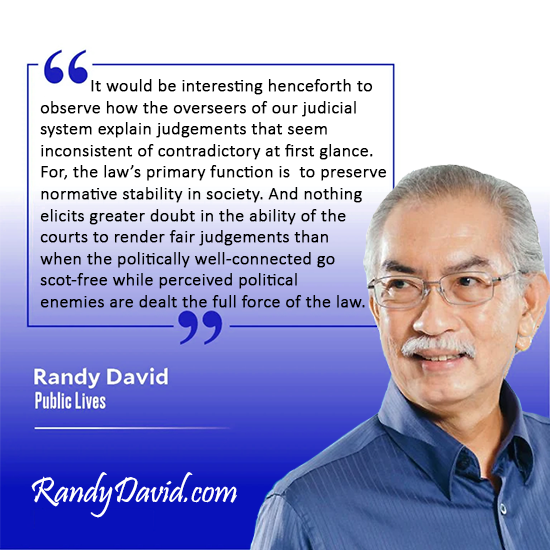
From her cell in Camp Crame, where she has been detained for over six years on charges filed during Duterte’s presidency, former senator Leila de Lima expressed disappointment over the denial of her petition for bail while awaiting trial in the third and final case against her. Everyone who has keenly followed the ordeal of this courageous woman applauded when another Regional Trial Court (RTC) judge recently acquitted her in a case involving pretty much the same charges. Her acquittal, however, did not mean she could already be freed. The last of the cases filed against her by Duterte’s justice secretary Vitaliano Aguirre was still pending before another RTC judge.
De Lima’s lawyers believe that she deserves to be provisionally released on bail while this last case is being heard. In the first place, she poses no risk of fleeing. Her staunch belief in her innocence means that, more than anyone, she is determined to clear her name properly before the courts. Her lawyers have consistently argued that she is the victim of fabricated and politically motivated charges, and that the evidence against her — consisting mostly of testimonies of convicted drug lords in prison who remain at the mercy of the justice department — is without credibility.
If these were not enough reasons to grant her bail application, her lawyers thought that humanitarian reasons might move the court to order her temporary release. The former senator, a senior citizen, has spent the last six years in prison without having been convicted. Indeed, she has been acquitted in two related cases. She suffers from chronic ailments that commonly afflict the elderly. She has been separated from her loved ones for far too long. But Muntinlupa RTC Branch 256 Judge Romeo S. Buenaventura saw it differently. He said he could not grant her application for bail, even as he hastened to clarify that this should not be taken to mean that the evidence was sufficient to warrant conviction. In his view, the evidence against the former senator, for purposes of bail, was strong and her release on humanitarian grounds “untenable.” It is fascinating that the Supreme Court felt it necessary to issue the same clarification in a June 8 statement of its Public Information Office.
“[T]he Court does not in any way prejudge what the final outcome of the case will be … The Order involves a different case from the earlier one pending before another Muntinlupa RTC Branch, where the former senator was acquitted and where witnesses recanted their testimonies. There were no recantations in the present case.”
It would be interesting henceforth to observe how the overseers of our judicial system explain judgments that seem inconsistent or contradictory at first glance. For, the law’s primary function is to preserve normative stability in society. And nothing elicits greater doubt in the ability of the courts to render fair judgments than when the politically well-connected go scot-free while perceived political enemies are dealt the full force of the law.
Consider Justice Secretary Jesus Crispin Remulla’s insistence that De Lima’s petition for bail should have been formulated as a humanitarian plea rather than as a petition based on the merits of the case. “I said if they cited humanitarian concerns and reasons instead of the merits of the case, then it’s possible that the government would not oppose her bail plea … But they chose to show off, or maybe to indirectly say that they think they can handle the case very well.”It is a clever ruse. If Remulla truly believed in the power of mercy, he would have simply not opposed the petition for bail without giving up the prosecution’s prerogative to pursue the case to the end. That would have been a small feather in the government’s cap. As Shakespeare put it, through Portia: “The quality of mercy is not strained. [Read constrained or conditional] It droppeth as the gentle rain from heaven …” [It’s freely given].
In contrast, had De Lima’s lawyers taken Remulla’s bait and begged for mercy to secure her release on bail, this would have been seen as a tacit recognition of the strength of the evidence against her. Doing so would have effectively canceled the powerful symbolism of her unjust incarceration in the last six years.
“The court’s denial of my bail application is most unfortunate,” she said in her statement from jail. “My lawyers will be filing an MR to raise the issue of credibility of the inmate witnesses and their testimonies anew, with the Hope that the judge is not yet closed to the perspective that their word, uncorroborated as they are by more acceptable evidence, is utterly unreliable and therefore completely not credible and unworthy of belief. Theirs are blatant lies and ludicrous stories … I’m determined to attain justice and vindication.”
